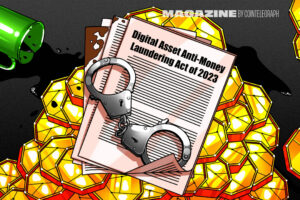
The United States Federal Reserve began its most aggressive quantitative tightening efforts in March 2022, raising benchmark interest rates in the year since from near-zero to 4.75% to 5% annually. While the central bank has successfully brought down inflation to some degree, the increasing interest rates are starting to cause cracks in the global banking industry.
The market expects the Fed to end quantitative tightening and provide favorable liquidity conditions to avoid a global financial crisis as the banks begin to fail. The shift in the Fed’s policy should have significant implications for financial assets.
Jurrien Timmer, the director of global macro at Fidelity, discussed the likely impact of the Fed’s dovish pivot on stocks, gold and Bitcoin.
Market expects the Fed to put an end to interest rate hikes
The Fed is largely expected to either maintain the interest rates at current levels or start cutting rates. CME’s FedWatch Tool shows that the market is currently placing a 50% chance that the March 25 basis point hike was the last one for a while.
CME FedWatch Tool as of March 30. Source: CME
If the Fed stops its rate hikes, risk assets like equities can experience a positive rally based on historical data. The average one-year return in the S&P 500 index after the last rate hike since 1984 has been 18.9%.
Post-rate pause rallies in the S&P 500 index since 1984.
Timmer also recently noted in a tweet that “The last hike is often (but not always) quickly followed by a cut.”
A rate cut would make credit cheaper across companies and individuals, improving the market’s liquidity. Low-interest regimes are often associated with bull runs in risk assets like stocks and crypto.
The last hike is often (but not always) quickly followed by a cut. pic.twitter.com/08czI2C6lq
— Jurrien Timmer (@TimmerFidelity) March 27, 2023
However, Timmer mentioned it is a “bullish development for stocks (lower cost of capital). But historically, the final Fed tightening produces anything but a clear-cut direction for stocks.” There have been instances where the stocks have maintained bearish trends for a couple of years before trend reversals.
If the Fed is done raising rates and takes a dovish pivot soon, as many expect, it could be a bullish development for stocks (lower cost of capital). But historically, the final Fed tightening produces anything but a clear-cut direction for stocks. Careful what you wish for. pic.twitter.com/xQw6WfcTjR
— Jurrien Timmer (@TimmerFidelity) March 30, 2023
Bitcoin and gold move in lockstep
However, the implications for gold and, by extension, for Bitcoin are largely bullish. If the Fed plans to start lowering interest rates and the inflation levels stay elevated, it leads to negative real interest for investors. The earning rate is less than the inflation rate and is, therefore, repressive. Financial repression works more smoothly than raising taxes or cutting spending, but it brings losses for bondholders.
Technically, gold staged a bullish breakout above the previous peak in 2023, around $1,950. This level also formed a long-term resistance to gold prices, signaling active buyer interest.
Timmer added, “When you get all three (negative real rates and positive price and monetary inflation), it’s a bullish trifecta for gold.”
Related: Is a housing crisis underway? Why crypto investors should care
The latest Bitcoin rally has seen a rising correlation with gold and a dip in its correlation with the S&P 500 index. Bitcoin and gold are moving in lockstep with a correlation coefficient value of one compared to a low proportional relation of 0.13 with the S&P 500 index.
Correlation coefficient of Bitcoin-gold (top), and Bitcoin-S&P 500 index (bottom). Source: TradingView
Bitcoin is benefiting from the narrative around a potential global banking crisis, strengthening its position as a non-correlated asset like gold. The BTC/USD pair’s positive breakout above $28,000 alongside gold further shows that buying activity is rising.
Thus, if the U.S. Fed pivots from the hawkish rate hike regime to a dovish stance, it could create bullish conditions for the market.
While the outcome for stock markets hangs in the balance due to inflation risks, gold is expected to shine in the medium term. Given the positive correlation with gold, Bitcoin may also benefit from the macroeconomic setting.
The views, thoughts and opinions expressed here are the authors’ alone and do not necessarily reflect or represent the views and opinions of Cointelegraph.
This article does not contain investment advice or recommendations. Every investment and trading move involves risk, and readers should conduct their own research when making a decision.
















